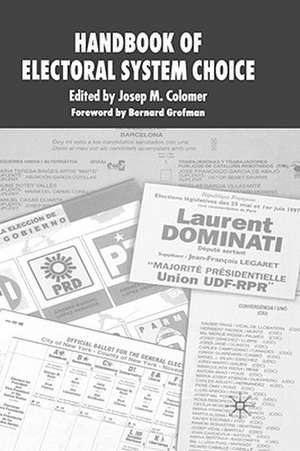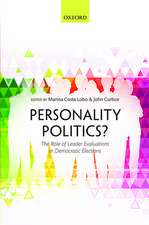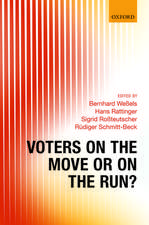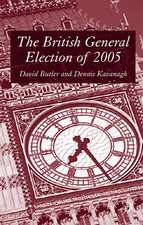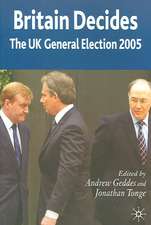The Handbook of Electoral System Choice
Editat de J. Colomeren Limba Engleză Hardback – 20 sep 2004
Preț: 1394.80 lei
Preț vechi: 1700.97 lei
-18% Nou
Puncte Express: 2092
Preț estimativ în valută:
266.98€ • 290.10$ • 224.41£
266.98€ • 290.10$ • 224.41£
Carte tipărită la comandă
Livrare economică 21 aprilie-05 mai
Preluare comenzi: 021 569.72.76
Specificații
ISBN-13: 9781403904546
ISBN-10: 1403904545
Pagini: 592
Ilustrații: XXII, 555 p.
Dimensiuni: 152 x 229 x 36 mm
Greutate: 0.99 kg
Ediția:2004
Editura: Palgrave Macmillan UK
Colecția Palgrave Macmillan
Locul publicării:London, United Kingdom
ISBN-10: 1403904545
Pagini: 592
Ilustrații: XXII, 555 p.
Dimensiuni: 152 x 229 x 36 mm
Greutate: 0.99 kg
Ediția:2004
Editura: Palgrave Macmillan UK
Colecția Palgrave Macmillan
Locul publicării:London, United Kingdom
Cuprins
Foreword; B.Grofman INTRODUCTION The Strategy and History of Electoral System Choice; J.M.Colomer THE AMERICAS The Americas: General Overview; J.M.Colomer Argentina: Compromising on a Qualified-Plurality System; G.L.Negretto Brazil: Democratizing with Majority-Runoff; J.M.Nicolau Costa Rica: Modifying Majoritarianism with 40 Percent Threshold; F.Lehoucq Mexico: Designing Electoral Rules by a Dominant Party; A.Diaz-Cayeros & B.Magaloni United States: The Past: Moving from Diversity to Unified Single Member Districts; E.Engstrom United States: The Future: Reconsidering Single-Member Districts and the Electoral College; R.L.Engstrom WESTERN EUROPE Western Europe: General Overview; J.M.Colomer France: Reform-mongering Between Majority-Runoff and Proportionality; G.Alexander Germany: Partisan Engineering of Personalized Proportional Representation; M.Kreuzer Italy: Lofty Ambitions and Unintended Consequences; D.Gambetta & S.Warner Spain: From Civil War to Proportional Representation; J.M.Colomer Sweden: Introducing Proportional Representation From Above; L.Lewin Switzerland: Introducing Proportional Representation From Below; G.Lutz United Kingdom: Reforming the Westminster Model; P.Dunleavy & H.Margetts EASTERN EUROPE Eastern Europe: General Overview; C.Flores Juberías The Baltics: Independence with Divergent Electoral Systems; E.Mikkel & V.Pettai Czech Republic: Entrenching Proportional Representation; P.Kopecký Hungary: Compromising Mid-way on a Mixed System; J.W.Schiemann Poland: Learning to Manipulate Electoral Rules; M.Kaminski Russia: Compromising a Long Lasting Transitional Formula; O.Shvetsova AFRICA Africa: Dictatorial and Democratic Electoral Systems since 1946; M.Golder & L.Wantchekon Africa: Electoral Systems in Emerging Democracies; S.Mozaffar South Africa: Proportional Representation in the Puzzle to Stabilize Democracy; A.Reynolds ASIA AND PACIFIC Asia and Pacific: General Overview; A.Hicken Australia: Replacing Plurality Rule with Majority-Preferential Voting; M.Sawer India: Majoritarian Democracy from Above; S.K.Mitra Indonesia: Transition and Change, but Electoral System Continuity; A.Ellis Japan: Manipulating Multi-member Districts: From SNTV to a Mixed System; J.Wada New Zealand: Reform by (Nearly) Immaculate Design; J.H.Nagel Glossary and Index; J.M.Colomer
Recenzii
'Electoral studies have long focused more on the effects than the causes of electoral rules. As Josep Colomer notes in his introduction to this volume,
however, the very strength of the effects leads to a natural line of theorizing about causes: Parties introduce new rules in anticipation of their effects on
those parties' future electoral fortunes. The individual essays in this volume
show that this simple notion plays out in many and sometimes subtle ways in
particular cases. Cumulatively, they provide the most extensive collection we
possess to date. Moreover, Colomer's synoptic overview shows that there is an important general trend visible in the historical record, toward greater
proportionality. Every serious student of electoral systems will want this
handbook on their shelf.' - Gary W. Cox, Professor of Political Science, University of California, San Diego
'This volume goes a long way in providing the necessary detailed historical evidence about the roots of electoral system change for a large and diverse set of democratic nations throughout recent history. Professor Colomer offers a new and highly original theory of electoral change which lays the groundwork for a radical revision of what has become the common wisdom about the effects of electoral laws. The chapters provide us a wealth of new information and new theoretical insights.' - From the Foreword by Bernard Grofman, Professor of Political Science and Mathematical Behavioral Science, University of California, Irvine
however, the very strength of the effects leads to a natural line of theorizing about causes: Parties introduce new rules in anticipation of their effects on
those parties' future electoral fortunes. The individual essays in this volume
show that this simple notion plays out in many and sometimes subtle ways in
particular cases. Cumulatively, they provide the most extensive collection we
possess to date. Moreover, Colomer's synoptic overview shows that there is an important general trend visible in the historical record, toward greater
proportionality. Every serious student of electoral systems will want this
handbook on their shelf.' - Gary W. Cox, Professor of Political Science, University of California, San Diego
'This volume goes a long way in providing the necessary detailed historical evidence about the roots of electoral system change for a large and diverse set of democratic nations throughout recent history. Professor Colomer offers a new and highly original theory of electoral change which lays the groundwork for a radical revision of what has become the common wisdom about the effects of electoral laws. The chapters provide us a wealth of new information and new theoretical insights.' - From the Foreword by Bernard Grofman, Professor of Political Science and Mathematical Behavioral Science, University of California, Irvine
Notă biografică
GERARD ALEXANDER University of Virginia, USAPATRICK DUNLEAVY London School of Economics and Political Science, UK ERIK ENGSTROM University of North Carolina, Chapel Hill, USARICHARD L. ENGSTROM University of New Orleans, USAALBERTO DIAZ-CAYEROS Stanford University, USA, and ITAM, MexicoANDREW ELLIS National Democratic Institute, Jakarta, IndonesiaCARLOS FLORES JUBERÍAS University of Valencia, SpainDIEGO GAMBETTA Oxford University, UKMATT GOLDER New York University, USAALLEN HICKEN University of Michigan, USAMAREK KAMINSKI University of California, Irvine, USA PETR KOPECKY University of Sheffield, UK, and University of Leiden, the NetherlandsMARCUS KREUZER Villanova University, USAFABRICE LEHOUCQ CIDE, Mexico LEIF LEWIN University of Uppsala, SwedenGEORG LUTZ University of Berne, SwitzerlandBEATRIZ MAGALONI Stanford University, USA and ITAM, MexicoHELEN MARGETTS University College, London, UKEVALD MIKKEL University of Tartu, EstoniaSUBRATA K. MITRA Ruprecht Karls University, Heidelberg, Germany SHAHENN MOZAFFAR Bridgewater State College, USAJACK H. NAGEL University of Pennsylvania, USAMONIKA A. NALEPA Columbia University, New York, USAGABRIEL L. NEGRETTO CIDE, MexicoJAIRO MARCONI NICOLAU IUPRJ, Rio de Janeiro, BrazilVELLO PETTAI University of Tartu, EstoniaANDREW REYNOLDS University of North Carolina, Chapell Hill, USAMARIAN SAWER Australian National University, Canberra, AustraliaJOHN W. SCHIEMANN Fairleigh Dickinson University, USAOLGA SHVETSOVA Washington University, St. Louis, USAJUNICHIRO WADA Yokohama City University, JapanLEONARD WANTCHEKON New York University, USASTEVEN WARNER Oxford University, UK
